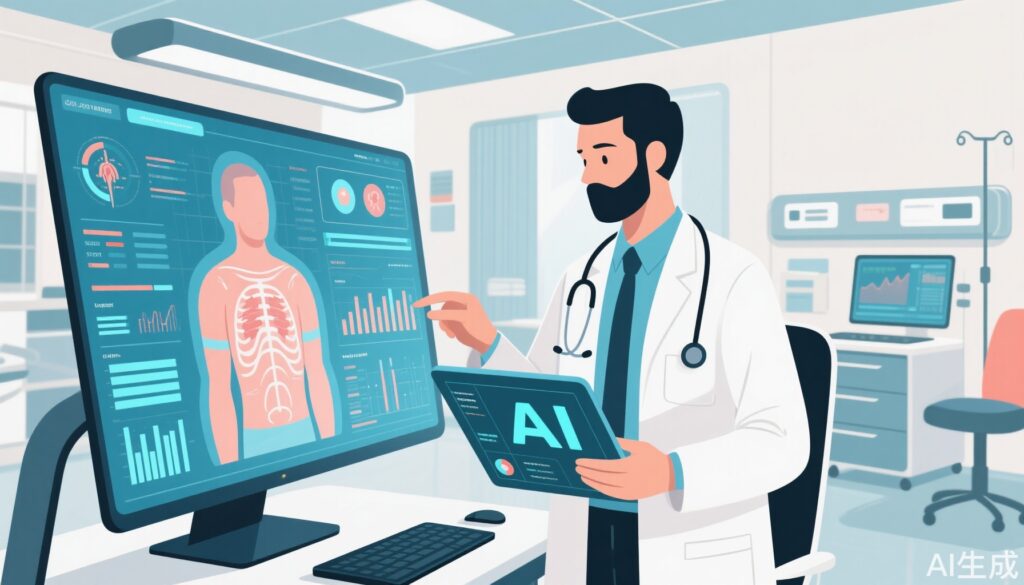Introduction
With 4.5 billion people currently without access to essential healthcare services and a projected health worker shortage of 11 million by 2030, artificial intelligence (AI) presents a transformative opportunity to bridge this gap and revolutionize global healthcare. As we strive to meet the United Nations’ Sustainable Development Goal of achieving universal health coverage by 2030, the role of AI becomes more critical than ever.
Despite rapid advancements in technology, the adoption of AI in healthcare remains “below average” compared to other industries, as reported by the World Economic Forum in its white paper, ‘The Future of AI-Enabled Health: Leading the Way.’ Different levels of private investment in AI within the healthcare sector indicate variability in adoption, though it is clear that AI digital health solutions have the potential to enhance efficiency, reduce costs, and improve health outcomes worldwide. Here are ten examples of how AI technologies are already making a significant impact in the medical field.
1. AI Can Interpret Brain Scans
Recent developments in AI software have led to a system that is “twice as accurate” as human professionals in examining brain scans of stroke patients. Trained on a dataset of 800 brain scans and tested on 2,000 patients, the AI was able not only to assess accuracy but also to identify the timescale of stroke incidents. This information is essential for determining eligibility for treatment options, with critical timeframes for medical intervention highlighted by Dr. Paul Bentley, a consultant neurologist.
2. AI Can Spot More Bone Fractures Than Humans
In urgent care settings, doctors miss detecting broken bones in up to 10% of cases. Given the shortage and heavy workload of X-ray technicians, AI’s ability to perform initial scans could reduce unnecessary X-rays and improve fracture detection rates. The UK’s National Institute for Health and Care Excellence (NICE) backs this technology as safe and reliable, potentially decreasing the need for follow-up appointments.
3. Assessing Ambulance Needs with AI
In the UK, paramedics face the challenge of deciding who requires hospital transfer among approximately 350,000 ambulance calls each month. A study found that AI could correctly predict the need for hospital transfers in 80% of cases based on various patient factors, emphasizing the technology’s impartiality. NICE has suggested that further training is necessary before wider implementation.
4. Detecting Early Signs of More Than 1,000 Diseases
AI machine learning models can identify certain diseases even before patients show symptoms. AstraZeneca’s model, created from medical data of 500,000 individuals, can predict disease diagnoses many years in advance. Dr. Slavé Petrovski emphasized the ability to detect early disease indicators, leading to interventions before clinical manifestations.
5. Clinical Chatbots to Guide Healthcare Decisions
As doctors require precise and rapid medical decisions, AI can expedite the process, albeit with the risk of providing biased information. A study indicated that ChatRWD, a retrieval-augmented generation system, provided reliable answers to 58% of medical inquiries. Digital platforms are also reducing the workload of healthcare providers, optimizing patient review time, and minimizing readmission rates.
6. AI in Imaging Diagnostics for Enhanced Accuracy
AI technology is enhancing the interpretation of imaging data such as MRIs and X-rays, allowing for faster and more accurate diagnoses. This technology supports radiologists by flagging abnormalities that may have been overlooked, thus improving patient care and clinical outcomes.
7. AI as a Second Opinion in Diagnosis and Treatment Recommendations
AI systems can serve as a second opinion for doctors in diagnosing complex conditions. By analyzing large datasets, AI can provide treatment recommendations based on patterns detected across various patient cases, ensuring that healthcare providers have the most comprehensive information available.
8. AI-Assisted Surgical Procedures
In surgical settings, AI is being employed to assist surgeons with precision in complex procedures. AI-enabled robotic systems can analyze real-time data during surgery, enhance visualization, and improve the accuracy of surgical interventions, resulting in better patient outcomes and reduced recovery times.
9. AI for Personalized Medicine
Utilizing vast amounts of patient data, AI can help develop personalized treatment strategies. By accounting for genetic, environmental, and lifestyle factors, healthcare providers can tailor treatments that are more effective and have fewer side effects, ultimately improving patient adherence and satisfaction.
10. AI and Traditional Medicine
Traditional medicine, practiced globally, integrates well with AI advancements. The World Health Organization’s brief on AI in traditional medicine indicates how AI can enhance this practice while preserving cultural heritage. By cataloging indigenous medical texts and exploring integrative approaches, countries are leveraging AI to enhance healthcare access and treatment diversity.
Conclusion
As AI continues to evolve within healthcare, its capabilities are set to transform numerous domains—from diagnostics to personalized treatment. Embracing these technologies responsibly can bridge existing gaps in healthcare delivery and promote better health outcomes globally. Ultimately, the intersection of AI with personalized and traditional medicine signifies a more inclusive and comprehensive approach to health and wellness.


